Otology/Neurotology
(446) Silicone Allergy Can Lead to Cochlear Implant Complication and Explantation
Monday, October 2, 2023
2:45 PM - 3:45 PM East Coast USA Time

- SA
Syed F. Ahsan, MD
Volunteer Clinical Associate Professor UC Irvine
Kaiser Permanente Orange County, California
Irvine, California, United States
Presenting Author(s)
Disclosure(s):
Syed F. Ahsan, MD: No relevant relationships to disclose.
Introduction: The objective is to report an unusual cause of cochlear implant complication and eventual explantation secondary to allergic reaction to silicone and review the literature.
Methods: Case Report and Review of the Literature. Literature review was performed using Pubmed. The case occurred in year 2022 in a large hospital based practice. The patient was evaluated with imaging , lab tests and eventually the cochlear implant was explanted. Patch testing of the implant components after device explantation was used to identify silicone allergy leading to the cochlear implant complication and eventual explantation
Results: Silicone allergy can cause cochlear implant inflammation leading to a foreign body reaction. This has been shown to be a type 4 hypersensitivity reaction which may play a role in cochlear implant complications. There have only been 7 reported cases of cochlear implant explantation secondary to allergic reaction to cochlear implants. The reaction has primarily been to the silicone component of the cochlear implant found in the silicone used in Cochlear America’s implants.
Conclusions: Although rare, it’s important to be aware of delayed hypersensitivity reaction to the silicone component of a cochlear implant. Attention should be made to associated symptoms such as pruritis, urticaria and loss of hair as symptoms and signs of possible allergic reaction to the implanted component. Steroids may help to alleviate symptoms however symptoms resume after steroids are stopped. Treatment requires removal of the device.
